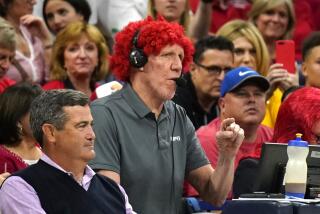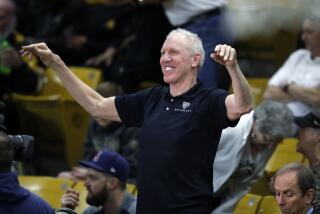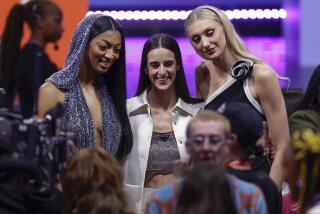This Battle of Big Men Always Surprised Kareem
- Share via
I don’t know if Wilt Chamberlain was the greatest basketball player of all time. I do know I’ve never heard the subject discussed when his name wasn’t mentioned.
His statistics were staggering. Ask me if it was more impressive that he once scored 100 points in a game or averaged more than 50 points in one season and more than 27 rebounds in two others or that he once led the NBA in assists, and I’d have to answer all of the above.
About the best thing you can say for his free-throw shooting during games was that he did it almost as well as Shaquille O’Neal. But someone who traveled with the famous 1971-72 Lakers--I can’t remember who--once told me that no one on the team could beat Chamberlain in free-throw shooting contests during practices, not Jerry West, not even the coach and legendary shooter, Bill Sharman.
But Captain Ahab had his whale, Jack Dempsey had Gene Tunney and Wilt had Bill Russell. If they weren’t the two best centers of all time, then they certainly were the best of their time, and while most of the numbers indicate that Chamberlain was the best, the only ones important to Russell supporters are that he finished his career with 11 NBA titles and that Chamberlain finished his with two.
You can argue that Russell had the better coach in Red Auerbach and the better supporting cast in players such as Bob Cousy and Sam Jones and K.C. Jones and John Havlicek. Wilt argued it for the rest of his life.
I’m not sure whether I agreed with him, but I understood that it was important for him to continue to fight the war long after it was over. I even admired him for it. The one he persisted in waging with Kareem Abdul-Jabbar, though, that was something different and, in my mind, it was the only thing that ever diminished the Big Dipper.
*
By the time I got to know Wilt a little in the early ‘80s, he had nothing good to say about Abdul-Jabbar.
When he would say, “I could outrebound him in my sleep,” he made sure you knew that he wasn’t merely questioning Abdul-Jabbar’s physical toughness or rebounding technique but his heart. When he pointed out that Abdul-Jabbar seemed fresh at the end of games, he wasn’t applauding him for his stamina but casting suspicion on whether he ever gave all of himself. Chamberlain called Abdul-Jabbar the Lakers’ “weakest link.”
Abdul-Jabbar, who by then had relinquished leadership of the Lakers to Magic Johnson but certainly wasn’t their weakest link, seemed genuinely bewildered when Chamberlain’s comments were repeated to him.
Kareem was 15 and Chamberlain, 10 years older, had already been in the NBA for three seasons when they were introduced at the Rucker tournament in Harlem. Abdul-Jabbar was impressed that Chamberlain had heard of him, even more so when Chamberlain asked him to hang out on occasion with him and his friends.
Chamberlain used to let Abdul-Jabbar borrow albums from his prized jazz collection and once gave him two silk suits from his closet. They, like their owner, had spent too much time out on the town.
“I thought about keeping the clothes anyway, just as a souvenir, but my mom said positively no, they’d just stink up the closet,” Abdul-Jabbar wrote in his 1983 autobiography, “Giant Steps.”
In the same book, he wrote a charming coming-of-age story about moving in on Chamberlain’s girlfriend, an attempt that earned him a peck on the cheek.
When Abdul-Jabbar did come of age, he and Chamberlain were not as close. But Abdul-Jabbar still had the highest respect for Chamberlain and his game, and based on the few times they played against each other, he believed the feeling was mutual.
“For Wilt, it’s the kind of thing where he has to knock me to make himself look good,” Abdul-Jabbar said when he discovered otherwise. “ . . . There’s nothing anybody can do about it, and at this point, whatever he says falls on deaf ears as far as I’m concerned.”
*
Of course, it didn’t fall on deaf ears. No matter how hard he tried to hide it, Kareem was hurt by Chamberlain’s criticism. Wilt was his mentor, his hero.
But, by the time he wrote his book, Abdul-Jabbar at least believed he understood it. He had taken issue with Chamberlain for becoming one of the few prominent African Americans to endorse Richard Nixon, also for offending African-American women in his own autobiography, and Abdul-Jabbar believed Chamberlain interpreted a difference in opinion as an attack.
They later did a commercial together and Abdul-Jabbar said their relationship was better. But it wasn’t, not really.
When I learned of Wilt’s death Tuesday, I called Kareem Productions on Wilshire Boulevard for a comment. I was told that Abdul-Jabbar wouldn’t be available for interviews, but a statement faxed to me read: “Wilt was one of the greatest players ever and we will never see another one like him.”
It seemed a little curt, although I’m not sure what else I wanted him to say. Wilt just would have been mad that Kareem had the last word.
*
Randy Harvey can be reached at his e-mail address: randy.harvey@latimes.com
More to Read
All things Lakers, all the time.
Get all the Lakers news you need in Dan Woike's weekly newsletter.
You may occasionally receive promotional content from the Los Angeles Times.






